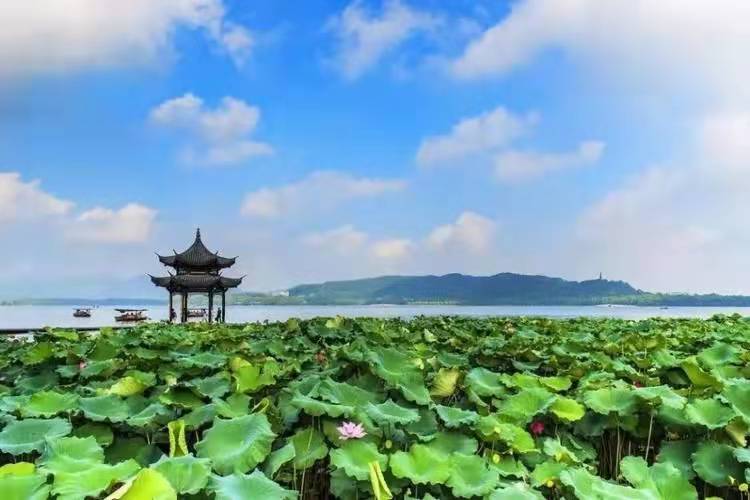Overview
Chinese Name: 西湖
English Name: The West Lake; Xi Hu
Location: Hangzhou,Zhejiang
Type: Natural and historical attraction
Rating Level: AAAAA (5A)

Brief Introduction
The West Lake西湖 is located in the west of Hangzhou city, Zhejiang Province, which was originally known as “Wulinshui Lake ” 武陵水湖 and later as “Qiantang Lake”钱塘湖. It began to be known as West Lake since Song Dynasty. It is famous at home and abroad for its beautiful lakes and mountains and numerous scenic spots and historic sites. It is a famous tourist resort in China and is also known as a paradise on earth.
The West Lake is one of the first national key scenic spots and one of the top ten scenic spots in China.
In 2007, Hangzhou West Lake Scenic Area was rated as “National 5A Tourist Attraction”. On June 24, 2011, “Hangzhou West Lake Cultural Landscape” was officially listed in the World Heritage List.

Surrounded by mountains on three sides, the West Lake covers an area of about 6.38 square kilometers. It is 2.8 kilometers wide from east to west and 3.2 kilometers long from north to south.

West Lake has influenced poets and paints throughout Chinese history for its natural beauty and historic relics, and it has also been among the most important sources of inspiration for Chinese garden designers.
Since 2002, Hangzhou has implemented the free opening of scenic spots around the lake park.
What worth to visit and see?
Scenery spot
Traditionally, there are ten best-known scenic spots on the West Lake, each remembered by a four-character epithet. Collectively, they are known as the “Ten Scenes of West Lake” 西湖十景. Each is marked by a stele with an epithet written in the calligraphy of the Qianlong Emperor.
Other attractions include
- Yue Fei Temple, the tomb and memorial hall to Yue Fei
- Lingyin Temple, a Buddhist monastery and surrounding hills
- Long Jing tea farms (龙井茶园), an area renowned for the quality of Tea
- Galloping Tiger Spring (虎跑梦泉), a spring famous for its mineral water
- Tomb of Su Xiao Xiao (苏小小墓)
- The West Lake Museum (located on the lakeshore) is dedicated to the cultural heritage of the West Lake.
Broken Bridge Canxue sites are one of ten scenes of West Lake, the winter is a unique landscape. And Broken Bridge back surface as a result of Hill City is in the North outside the lake and watershed point in the lake, the broad field of vision is the best winter snow watch West premises.

Leifeng Pagoda located on the sub hill of Nanping mountain is a must of travel to the West lake because of its sunset sights. New Leifeng Pagoda was built over the old thunder on the site, Tazuo part becomes ruins exhibition hall, and there are many kinds of literature for visitors.

Dongpo Pork is a dish named after Song Dynasty (960-1279) poet Su Dongpo, who was also a governor in Hangzhou and had built the causeway across the lake.

Culture
Since ancient times, west Lake has been popular with folk legends and fairy tales such as The Legend of the White Snake白蛇传, Liang Shanbo and Zhu Yingtai梁山伯与祝英台, and Su Xiaoxiao苏小小. In the legend of the White Snake, “The broken bridge meets” and “Lady White is crushed by Leifeng Pagoda” are related to the ten scenes of the West Lake.
Over the centuries, the beauty and culture of West Lake have attracted numerous literati, who left behind works of literature and poetry to describe the lake. For example, Dream in West Lake西湖寻梦 and The Enchiridion of Lake and Mountain湖山便览 recorded a lot about West Lake and ancient Hangzhou historic anecdotes. Poets such as Bai Juyi, Sushi, and Hu Shih also wrote countless poems about West Lake.

In the Southern Song Dynasty, Hangzhou was the capital city, where a group of landscape painters gathered and left many masterpieces.

The Landscapes of four seasons was painted by Liu Songnian with the theme of the four seasons of spring, summer, autumn, and winter. The composition is in Beijing Place Museum now.

West Lake is said to be the incarnation of Xishi, one of the Four Beauties of ancient China. Since ancient times, West Lake was associated with a large number of romantic poets, profound philosophers, national heroes, and heroines. West Lake was also the retreat for many Chinese writers of the past.